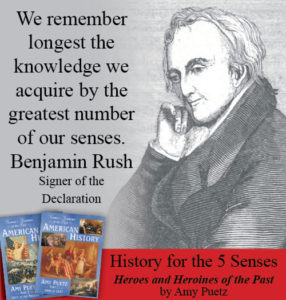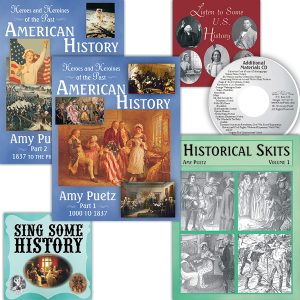Hands On History by Golden Prairie Press

By Dr. Benjamin Rush (Signer of the Declaration)
In this letter from 1791, Dr. Benjamin Rush points out why he thinks the Bible should be used as a schoolbook. Some of the language may be a bit outdated but the message still rings true.
1. In contemplating the political institutions of the United States, I lament, that we waste so much time and money in punishing crimes, and take so little pains to prevent them. We profess to be republicans, and yet we neglect the only means of establishing and perpetuating our republican forms of government, that is, the universal education of our youth in the principles of Christianity, by means of the Bible; for this divine book, above all others, favors that equality among mankind, that respect for just laws, and all those sober and frugal virtues, which constitute the soul of republicanism.
2. We are subject, by a general law in our natures, to what is called habit. Now if the study of the scriptures be necessary to our happiness at any time of our lives, the sooner we begin to read them, the more we shall be attached to them; for it is peculiar to all the acts of habit, to become easy, strong and agreeable by repetition.
3. It is a law in our natures, that we remember longest the knowledge we acquire by the greatest number of our senses. Now a knowledge of the contents of the Bible, is acquired in school by the aid of the eyes and the ears, for children after getting their lessons, always say them to their masters in an audible voice; of course there is a presumption, that this knowledge will be retained much longer than if it had been acquired in any other way.
4. There is a native love of truth in the human mind. Lord Shaftesbury says, that “truth is so congenial to our minds, that we love even the shadow of it.” And Horace, in his rules for composing an epic poem, establishes the same law in our natures, by advising the “fictions in poetry to resemble truth.” Now the Bible contains more truths than any other book in the world: so true is the testimony that it bears of God in his works of creation, providence, and redemption, that it is called truth itself, by way of preeminence above things that are only simply true. How forcibly are we struck with the evidences of truth, in the history of the Jews, above what we discover in the history of other nations? Where do we find a hero, or an historian record his own faults or vices except in the Old Testament? Indeed, my friend, from some accounts which I have read of the American Revolution, I begin to grow skeptical to all history except to that which is contained in the Bible. Now if this book be known to contain nothing but what is materially true, the mind will naturally acquire a love for it from this circumstance, and from this affection for the truths of the Bible, it will acquire a discernment of truth in other books, and a preference of it in all the transactions of life.
5. There is a peculiar aptitude in the minds of children for religious knowledge. I have constantly found them in the first six or seven years of their lives, more inquisitive upon religious subjects, than upon any others. And an ingenious instructor of youth has informed me, that he has found young children more capable of receiving just ideas upon the most difficult tenets of religion, than upon the most simple branches of human knowledge. It would be strange if it were otherwise, for God creates all his means to suit all his ends. There must of course be a fitness between the human mind, and the truths which are essential to its happiness.
-

Heroes & Heroines of the Past: American History Curriculum
$130.00 WY sales tax Select options This product has multiple variants. The options may be chosen on the product page